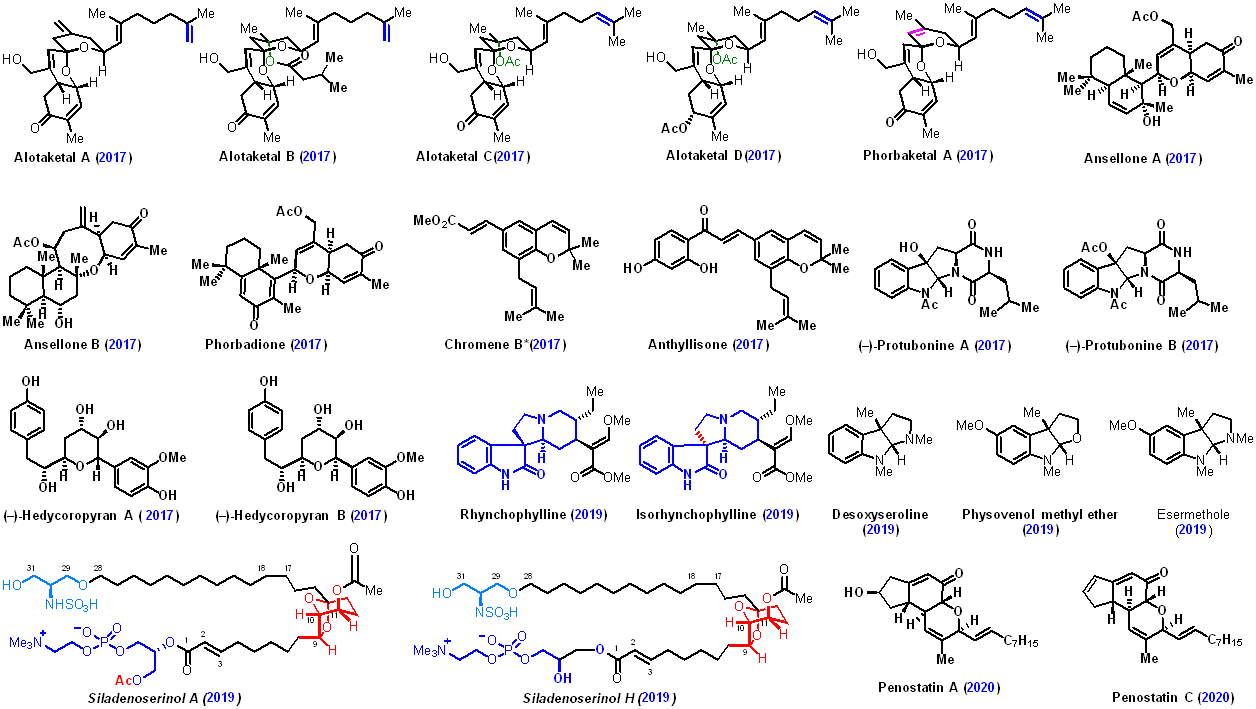

|
Our research interest includes:
(1) Total Synthesis of
Natural Products; (2) Synthetic Organic
Methodology; (3) Medicinal Chemistry; (4) Green
Chemistry
(1)
Total Synthesis of Natural Products Natural products, also known as secondary metabolites, have been not only the most productive source for new therapeutic agents but also the most thought-provoking inspiration for new synthetic strategies and methodologies, which tremendously advance the synthetic organic chemistry. Total synthesis of natural products is arguably regarded to be the most challenging field in chemistry. The Tong group leverages Nature's strategy and exploit various rearrangement reactions for total synthesis of bioactive natural products. We place our top priority for development of a general, flexible, and collective strategy for the whole family of natural products.
Representative
Completed
Natural Products (2016-2020)
 (2) Synthetic Organic Methodology Synthetic organic methodology addresses the reactivity and selectivity issues of organic reactions and the Tong group aims to uncover new reactivity of readily accessible organic compounds and to control the selectivity of known reactions. In addition, we emphasize the synthetic utility of organic methodologies, in particular in the total synthesis of natural products or bioactive molecules. Recent examples of organic methodologies from the Tong lab at HKUST
Medicines (drugs, therapeutic agents) used for treatment of various diseases are often small organic molecules, which are either synthetic or natural compounds. This provides unique opportunity for synthetic organic chemists to make contributions to economy and health of our society, especially human health and foods. Medicinal chemistry is at the intersection of chemistry and biology, especially synthetic organic chemistry and pharmacology, which involves design, chemical synthesis and evaluation of bioactivity. Nevertheless, the central theme of medicinal chemistry is organic synthesis that supplies a library of various organic molecules through total synthesis or chemical modification for evaluation of biological activity. The Tong lab leverages the resources of natural products in the lab and capability of total synthesis for development of new drugs. Currently, we are focusing on medicinal chemistry of anticancer, antiviral, and antibiotic natural products.
(4) Green Chemistry Green chemistry is the design of chemical products and processes that reduce or eliminate the use or generation of hazardous substances. Green chemistry, also known as sustainable chemistry, applies across the life cycle of a chemical product, including its design, manufacture, use, and ultimate disposal. Organic compounds constitute the majority of known compounds and find wide applications in our life with many diverse commercial products including pharmaceuticals, agrochemicals, cosmetics, lubricants, coatings, plastics, electronics, explosives, and flame-retardants. However, most chemical processes to produce these organic compounds have the potential to cause a negative impact on the health and environment. It is therefore essential to eliminate the risk or at least reduce it to an acceptable level through green chemistry approach. The Tong group has been focused on development of new green chemistry for oxidation reactions, especially halide-mediated oxidation reactions including halogenation reactions. Different from much less toxic or hazardous reduction (NaBH4 or LiAlH4, Pd/H2), the oxidation reactions usually employed toxic and hazardous heavy transition metals such as chromium (PCC), manganese (KMnO4), lead [Pb(OAc)4], osmium (OsO4), hypervalent iodine (IBX), bromine (Br2) etc. One of our recent goals is to replace the toxic N-bromosuccinimide and hazardous bromine in organic reactions and we have made a great achievement. Our recent efforts on this area lead to development of our second and third generations of protocols for green halogenation and oxidation, which closely mimics the reactivity of haloperoxidases in Nature.
|
|